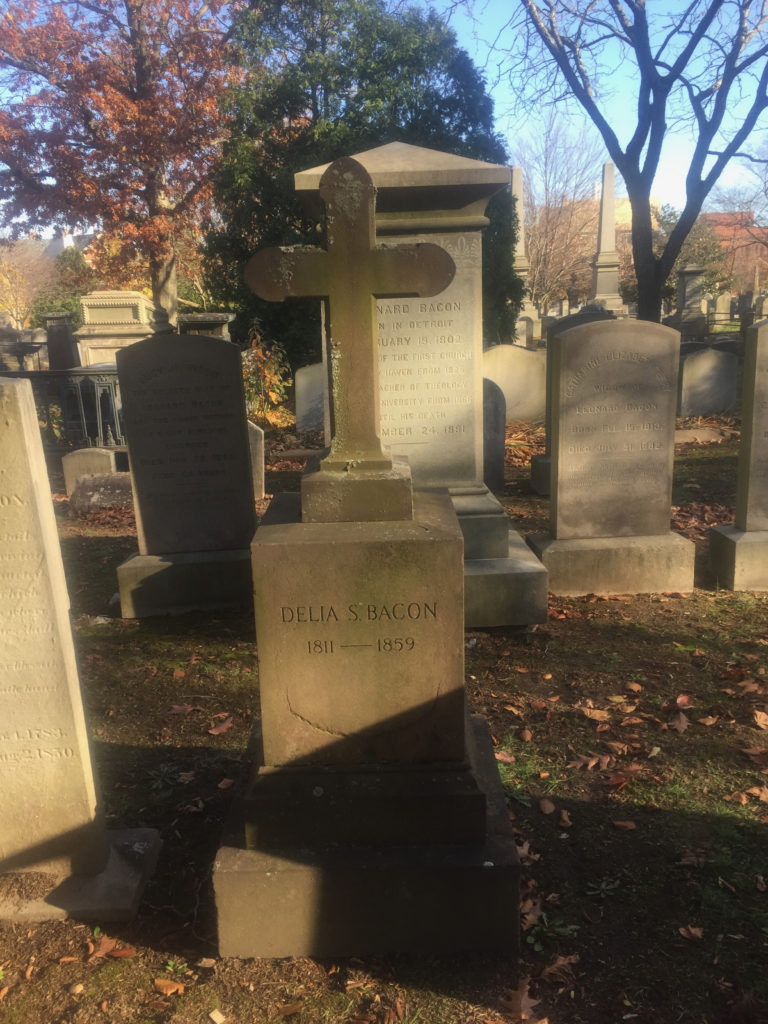Erik Visits an American Grave, Part 765
This is the grave of Delia Bacon.

Born in 1811 in Tallmadge, Ohio, Bacon didn’t have a great start to life. Her father was a Congregationalist minister in Connecticut, but he had some sort of vision and decided to move to the Ohio frontier, where he engaged in some financial plans that failed miserably. They returned to Connecticut, her father died, and the family was left in shaky finances. Her older brother did manage to go to Yale, but none of the other children received the kind of formal education that one would expect from their original class position.
Bacon had to leave school at 14, but that did not stop someone from becoming a school teacher in the early 19th century. In fact, she was not only a very good teacher, but kind of a pioneer at teaching young women. This was in part because for how little training she had, her teacher had been Catharine Beecher, inventor of modern housework and one of that legendary reformer family of the first half of the nineteenth century. Bacon went further than just teaching, developing curriculum for teaching history and literature and then giving lectures about it through the northeast, helping her make a good living.
Bacon then became a writer of both fiction and history. In 1831, she wrote Tales of the Puritans, a book of three narrative historical stories about those religious whackos. The next year, she won a short story contest; second was Edgar Allan Poe. She moved to New York in 1836 and started writing plays. She got the leading Shakespearean article to star in one of them, though it didn’t do well. Bacon was also, well for the time anyway, sexually free. She was having an affair, or at least a possible affair, with the minister Alexander McWhorter. She was 36, he was 23. It was exposed by her own brother, who she had a terrible relationship with. McWhorter was nearly kicked out of the ministry and was acquitted by a 12-11 vote, with the vote based on who seduced her. She seduced him according to those 12. Bacon had to leave New York and go to Ohio to escape the scandal.
While Bacon was in Ohio exile, she started writing up her theory that “William Shakespeare” did not write Shakespeare’s plays. I have to say that there is effectively no debate in human society I find more tendentious and pointless than the theory that someone else wrote Shakespeare’s plays. Here’s my position: who cares? Someone wrote them. Does it really matter who? Isn’t the point that they are amazing plays? Anyway, Bacon became well known for this theory. Basically, she believed, given that there was so little information about Shakespeare’s life that they couldn’t be written by him and also that they could not have been written for popular consumption. Her theory is that the plays were written by a group of elites that included Sir Walter Raleigh, Edmund Spenser, and Francis Bacon and written not for the public but rather to institute a system of philosophy in the nation. She published all this in 1857, with The Philosophy of the Plays of Shakespeare Unfolded. She even managed to go to England in 1853 on a research trip for this. She started writing about it while living there and…it did not go well and journals quickly stopped publishing her there so she returned to the U.S., not altogether by her own will.
This all seems ridiculous to me, but Bacon had lots of well known friends, including Nathaniel Hawthorne and Ralph Waldo Emerson, as well as the powerful reformist Beecher family. Emerson said she was “with genius, but mad and clinging like a tortoise to English soil.” Walt Whitman was even more effusive, writing she was, “the sweetest, eloquentist, grandest woman…that America has so far produced….and, of course, very unworldly, just in all ways such a woman as was calculated to bring the whole literary pack down on her, the orthodox, cruel, stately, dainty, over-fed literary pack – worshipping tradition, unconscious of this day’s honest sunlight.”
Say this for her, Bacon was one of the first people to really go all in on the Shakespeare conspiracy theories and remains influential with these people today. Take that for what you will.
What’s worse is that this obsession moved into mental illness. She started hanging out at Shakespeare’s grave while in London, hoping to get access and prove for real that he was fake. It got so bad that she was put into an asylum in England, which is finally what forced her back to the U.S. Things didn’t improve back home. She ended up back in an asylum in Connecticut. Bacon died in a Hartford asylum in 1859. She was 48 years old.
Delia Bacon is buried in Grove Street Cemetery, New Haven, Connecticut.
There’s not a lot of analogies to Bacon in American life of the nineteenth century. But some have claimed she is a mother of modern literary criticism. So if you would like this series to visit other literary critics, you can donate to cover the required expenses here. Mary McCarthy is in Castine, Maine and Cleanth Brooks is in Baton Rouge, Louisiana. Previous posts in this series are archived here.


